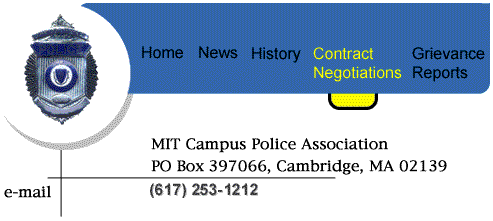

Negotiations Update
Negotiators for the MIT Campus Police Association and MIT met once again on September 24, 1999 in a further attempt to reach a new collective bargaining agreement. Efforts were unsuccessful. MIT persisted in its refusal to give patrol officers protection against involuntarily call-ins on their days off. Although the Association has agreed that it would allow call-ins in cases of emergency and during the graduation period, MIT insists that officers remain at its beck and call on all other days off as well. The refusal by MIT to recognize and honor the family and personal lives of officers remains a pivotal issue in the negotiations.
MIT also continues in its refusal to recognize the value to the MIT community of the EMT (i.e. Emergency Medical Technician) skills which officers posses. Officers, who are also trained and certified as EMT's, are able to intervenue with emergency measures in the event of sudden illness or injury of MIT students, employees, or visitors. Such intervention might well mean the difference of life and death in a given situation. The Association believes that its members have long been underpaid for the possession and use of these skills. It will not sign a new contract until if and when MIT agrees to equalize the level of the EMT differential with the value which EMT certification brings to the MIT community.
MIT also clings tenaciously to its stated view that there is no correlation by the police work performed by campus police officers and education achievement by those officers. In doing so, MIT not only dishonors its own legacy as a world class education institution, but ignores the standards for the police department accreditation which expressly recognize the value of higher education in modern policing. Although the MIT Police Department has expanded substantial efforts to obtain accreditation (it is not yet accredited), it has disowned in collective bargaining the very standards it says it is trying to achieve. One has to wonder if the Police Department really wants to become accredited, or is just paying lip service to the accreditation process for whatever political value it might have.
No Confidence Vote
From time to time, MIT has intimated that during contract negotiations that leadership of the Association is not fairly reflecting the views of its membership. Inferentially, this intimation suggests that if the membership really knew what was going on, it would override its leadership and gratefully accept MIT's proposals for a new contract. To test its hypothesis, MIT recently sent out to all members of the Association a copy of its proposals for a new contract. The response from the membership of the Association reduced MIT's hypothesis to rubble. To an officer, the members returned their unsolicited mail to sender, with an affirmation that the Association did in fact speak for them, and that MIT would be better served by spending its time productively at the bargaining table than by attempting to undermine the Association's efforts to achieve a dignified contract settlement.
The Association concedes without apology that it has taken an aggressive approach in dealing with the management of MIT's Police Department. However daunting the task of grappling with one's own employer, particularly one as prestigious as MIT, the Association believes that its approach has been necessitated by the undignified and disrespectfully treatment its members have received from police management regarding terms and conditions of employment. The Association has validated its own hypothesis in this regard, by objectively testing for symmetry between the views of its leadership and its membership. That test has come in the form of a survey of its members concerning their views of the MIT police management, which exists primarily in the hands of the police chief.
The survey, given to all members of the patrol force, asked officers to rate the Police Chief in 12 specific areas, and to vote whether they had confidence in the Police Chief's ability to lead the Department. The results were stunning. All 38 officers replying to the survey gave the police management in at least 11 of the 12 categories surveyed, and all 38 officers voted "No Confidence" in the Police Chief's ability to bring the department together and to end all the consuming morale problems within the Department.
The Association is recommitted, in light of its survey results, to obtaining a fair and dignified outcome of its negotiations, and asks for your support.
If you would like to contact the MIT Campus Police Association in its fight for a fair contract, please call or write the following MIT representatives and indicate your support for change in MIT's approach to the negotiations.
Charles M. Vest
President
(617) 253-0148
cmvest@mit.eduJohn R. Curry
Executive Vice-President
(617) 253-1882
jcurry@mit.eduDavid B. Achenbach
Manager, Labor Relations
(617) 253-4264
david@mit.eduAnn Glavin
Chief, MIT Police
(617) 253-9760
aprg@mit.edu| Home | News | History | Contract Negotiations | Grievance Reports | E-mail |
All information is trademark and copyright 1999 MITCPA.